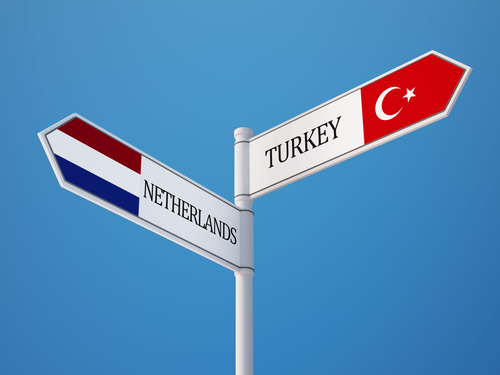Inspite of seeing her making out passionately with another man at the
staircase, he decided to ignore the issue, but confront – and prosecute – her for
the affair she had 10 years ago. I was advised* to start off with a sexy tone to
lure readers into skimming through…I hope that was sexy enough, albeilt the
unappealing context of this article. Now,
the hot affair is a perfect analogy for what has happened between The Netherlands
and Turkey following the famous Armenian genocide recognition vote.
On 22 February, the
lower house of the Dutch Parliament approved a motion that recognises the
Armenian genocide of 1915 by the Ottoman Empire. According to Christin Union parliamentarian
Joel Voordewind, The Netherlands ¨cannot deny history out of fear
of sanctions. Our country houses the capital of international law
after all, so we must not be afraid to do the right thing here too".
"We are acknowledging history", he said. Turkey obviously was livid,
and explained that the Ottomans at the time acted within the context of a
raging confrontation with Russia during World War One. In a clever answer, Turkey’s
Foreign Ministry indicted that “The baseless decisions taken by the parliament
of a country that turned a blind eye to a genocide — whose pain still has not
eased — in Srebrenica, in the middle of Europe, have no legal binding or
validity´´.
The question of why, the basis, and purpose of the vote will not be
addressed by this article. However, the timing will be. As I am typing, Syria's besieged Eastern Ghouta region is being bombarded. Intense shelling has
already killed over 400 people since Sunday evening, with 79 children among the
dead. One must wonder whether this is not yet another genocide that must be
given priority in international condemnation. What happened to Armenians over
100 years ago is not to be ignored or belittled, but those people have
perished, and so have the governments that orchestrated their deaths. Nothing
can be done to right the wrongs. Historic recognition is admirable, but has no
value other than sentimental.
Perhaps
parliamentarians across the world should not wait for another 100 years to cry
over the unjust death of the innocent and helpless. There is still a chance to
save Syrians and Yeminis and Afghanis and Iraqis from a plethora of genocide-associated-acts
that are committed on a daily basis.
International
recognition of the Armenian genocide came after years of documentation, research,
lobbying, and persistence – all of which are commendable. No one should deny
the tragedy of killing 1.5 million Armenians…but the death of 79 children is
also tragic, and unjust. Only it is a contemporary type of injustice that is
politically charged and historically blurred. The facts have not settled in,
but people are settled in their graves.
The Netherlands, and
many other countries, have acted like the wronged husband. He had every reason
to confront his wife with regard to the affair she had 10 years ago, but should
have prioritised the more recent, pressing, and not-totally-substantiated fully
fledged affair. Doing the latter could save the marriage, while the former
would not…it would only document an act of the past. The Netherlands, and the international
community at large, should consider doing the same.
The relations
between The Netherlands and Turkey are currently lukewarm, and the estranged
NATO members have both withdrawn their diplomatic representation following
another earlier dispute. Amidst present circumstances and heightened political
conditions, it would be advised that these two important partners try to mend
relations and look at the bigger picture. Now is not the time to recriminate
one another for past mistakes committed by previous leaderships. More pressing
issues are at stake, and reconciliation is necessary.
In the spirit of
love and sexiness as recommended above, ELO´s song (One Step at
a Time) has insights for those in rocky relations, including nations.
*You know who you are, and how dear you are.





No comments:
Post a Comment